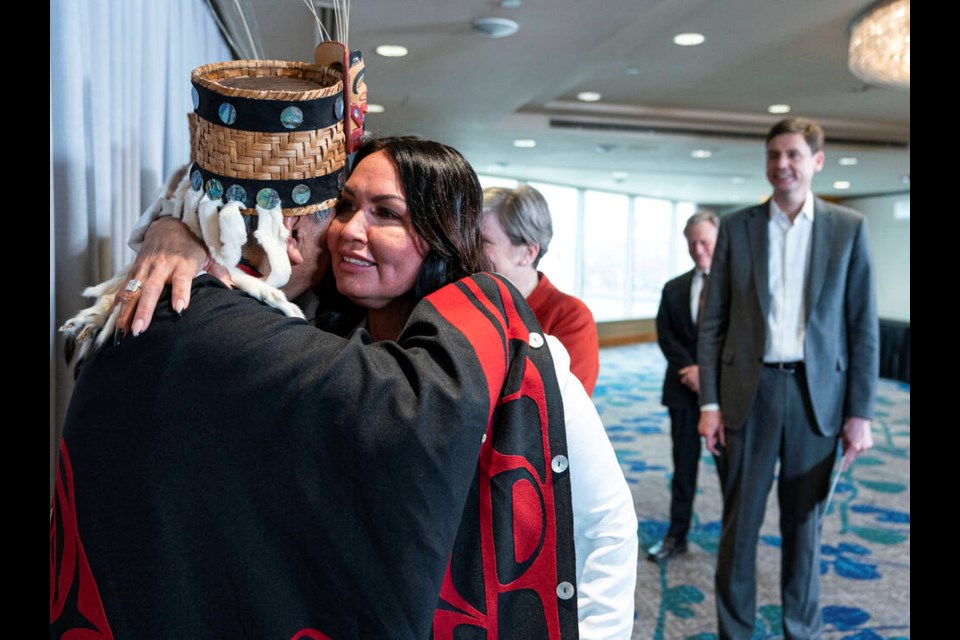Premier David Eby did his best to have it both ways on Tuesday.
He hailed the approval of an Indigenous-owned liquefied natural gas processing plant on the north coast that a First Nations chief said will change the course of history.
Simultaneously, he unveiled a new version of an LNG regulatory regime that requires such plants to reach net zero emissions by 2030.
So he’s firming up NDP climate change commitments to lower emissions at the same time he’s allowing another carbon-emitting LNG plant in the Kitimat region to start up.
It took a bit of doing, to be sure.
The two announcements were mushed together initially. Then the new regulatory regime was detailed at great length later at a separate news conference.
There was much emphasis on the promise that the Haisla plant will be the cleanest in the world.
Cedar LNG is a partnership with Pembina Pipeline Corp. in which the Haisla holds a majority interest.
It is a $2.4-billion plan to build a floating marine terminal in Douglas Channel.
The government noted in its approval that the GHG emissions intensity is .08 tonnes of CO2 equivalents per tonne of LNG, with the plant designed to produce three million tonnes a year.
The figure is considered among the lowest in the world.
But the project will have to plan to reduce emissions further even while construction is underway, in order to meet the 2030 target.
Officials said the proposed plant aligns with B.C.’s climate legislation and reduction plans.
The official approval document stated: “While concerned about the potential for Cedar LNG to affect B.C.’s 2030 targets, we are of the view there is a path forward to meeting provincial targets that includes Cedar LNG.
“In addition, in our role as decision makers we have considered the benefits of economic reconciliation with Haisla Nation.”
The phrase “cleanest in the world” was also used when the nearby LNG Canada plant was announced five years ago.
But the government had a different posture then on the huge LNG Canada project.
The NDP at that time rejigged the original deal with the consortium proposing that plant to make it more favourable. An LNG tax was scrapped and a lengthy deferral of provincial sales tax was devised, along with a standard electricity rate.
There was no talk of concessions Tuesday with the Haisla.
B.C. Liberal critic Ellis Ross, a former Haisla chief who spent years advancing the LNG concept for his nation, said he hopes it gets the same tax treatment. The government imposed 16 legally enforceable conditions that Cedar LNG must meet.
In addition to the emission concerns, they cover marine transportation, future regional cumulative effects and a medical plan to reduce pressures from an outside workforce on local resources.
The project will bring a few dozen tankers a year up the channel.
In the years since then-premier Christy Clark committed to LNG, the concept has shrunk markedly.
Up to 19 plants were on the drawing board during the initial gold rush phase.
LNG Canada, about four times bigger than Cedar, is the only major one to proceed and is midway through construction.
There are two other minor projects on the south coast in the works.
Cedar is the first Indigenous-owned one, and is also the largest Indigenous-owned infrastructure project in Canada.
Haisla Chief Councillor Crystal Smith said the event was more than just about approving a construction project.
“Today is about changing the course of history for my nation and Indigenous people everywhere.”
Eby stressed Indigenous reconciliation during the announcement, listing numerous steps taken by the NDP.
He said approving the Haisla project is another step in that journey.
There will be 500 construction jobs and about 100 full-time workers when the plant starts operating.
The plant brings the NDP and B.C. Liberals together.
Ross said he was “extremely gratified that an initiative we worked on, on behalf of the Haisla people, finally got the respect it deserves.”
Ross said a glaring issue is whether B.C. can supply enough power to the industry that is finally taking shape.
Eby is going on a trade mission in coming days and Ross urged him to promote B.C.’s LNG on the trip.
>>> To comment on this article, write a letter to the editor: [email protected]




